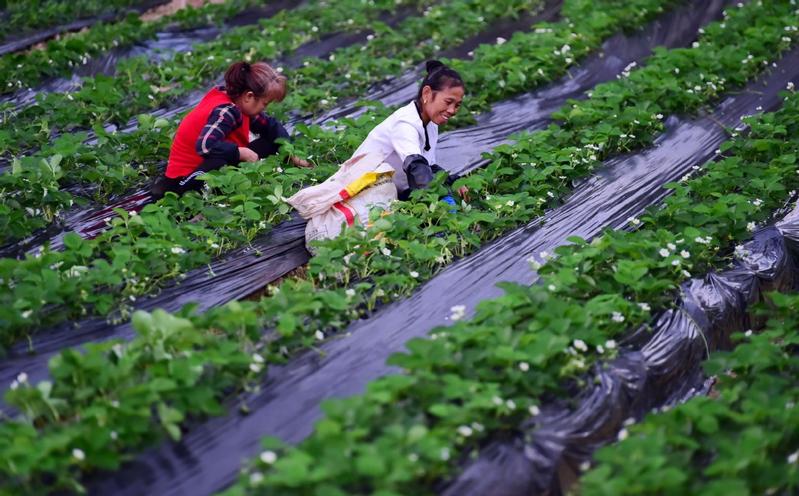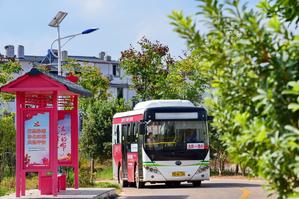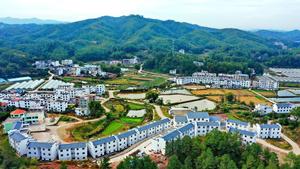Rich rewards reaped after poverty shaken off
 Residents of Gufang village, Huichang county, Jiangxi province, work in a strawberry greenhouse. (ZHU HAIPENG / FOR CHINA DAILY)
Residents of Gufang village, Huichang county, Jiangxi province, work in a strawberry greenhouse. (ZHU HAIPENG / FOR CHINA DAILY)
A decade ago, Zou Yongcun and his family were forced to relocate a short distance to his home village due to his wife's health.
She was diagnosed with lupus erythematosus, a disease affecting the immune system, and femoral head necrosis, in which the blood supply to the highest part of the thigh bone is disrupted and the bone dies.
The costly fees for her treatment quickly depleted the family's savings.
Zou had no choice but to close his garment business in Huichang county, Jiangxi province, and return with his wife and two children to the nearby impoverished village of Gufang.
In recent years, with the help of the government's poverty alleviation policies, the village has made full use of its location and natural resources to foster new businesses such as growing fruit and vegetables, along with rural tourism.
After he returned home, Zou and his family were classified as an impoverished household, but he landed a job managing 2 hectares of vegetable greenhouses in the village, earning 2,000 yuan (US$305) a month.
His wife benefited from preferential policies, with the majority of her medical bills reimbursed, greatly reducing the financial burden on the family, and in 2014, Zou, his wife, daughter and son were lifted out of poverty.
Two years later, the entire village was free of poverty. Now, with the rapid development of local industries, Gufang is well on the way to rural revitalization and Zou is regaining his confidence in life.
The village is only 3 kilometers from the downtown area of Huichang county, but is completely different to it.
While the downtown has a population of 500,000, numerous rows of buildings and bustling businesses, the village is home to just 1,371 residents, green hills, clear ponds and tidy farmland.
The hard-working villagers have prospered by planting peaches, navel oranges and red bayberries, as well as breeding fish.
However, although Gufang was taken off the poverty list in 2016, there was still a wealth gap between the village and the downtown area.
 A new bus stop in Gufang village makes it easier for residents to travel to the county seat of Huichang and elsewhere. (ZHU HAIPENG / FOR CHINA DAILY)
A new bus stop in Gufang village makes it easier for residents to travel to the county seat of Huichang and elsewhere. (ZHU HAIPENG / FOR CHINA DAILY)
In recent years, the Central Committee of the Communist Party of China has stressed the importance of rural revitalization. This means making agriculture a promising industry, farming an attractive profession and the countryside a beautiful place for villagers to live in and thrive.
Gufang Party chief Zhou Liansheng said that after noticing the disparity between the village and the downtown area, officials set a target to make Gufang the "backyard" of Huichang county, with downtown residents visiting it to relax and enjoy leisure time on holidays or during weekends.
"With this goal in mind, we established a cooperative among the villagers, rented land from them, set up fruit gardens, grew different types of plants, and opened the gardens to tourists from the urban area to pick fruit and experience the joys of harvesting," Zhou said.
Fruit planted in the gardens not only includes that found locally, such as peaches, navel oranges and red bayberries, but also some newly introduced varieties, including pitayas, watermelons and grapes, Zhou said.
"We also built a restaurant, cleaned the ponds and bred fish in them, so that in addition to harvesting fruit, tourists can fish and have meals in the countryside," he added.
Zou Shirong, director of the cooperative, said the venture was established in 2016 and was joined by 108 of the 242 households in the village-nearly all the impoverished families in Gufang at the time.
The 38-year-old also helped launch the cooperative. Born and raised in Gufang, he went in search of work in his late teens and became a successful businessman in Guangdong province before being invited by village officials to return home to start the cooperative and "build a new countryside".
"We rented 700 mu (46 hectares) of farmland and 3,000 mu of land in hilly areas, on which we constructed greenhouses for fruit, as well as flowers, vegetables and aquaculture bases," he said.
"We also hired villagers to work in the greenhouses and restaurant, enabling them to have two incomes-that from renting land to the cooperative and also from the salaries they earn by working for cooperative businesses. All these earnings can amount to more than 2,000 yuan a month per head," he said.
With red bayberries ripening from March to May, peaches and grapes from June to August, kiwi fruits in September, pitaya in October and navel oranges in November and December, the fruit gardens are attractive to tourists nearly all the year around. They are known affectionately by villagers as "four-season orchards".
Zhou said the village now attracts 10,000 tourists each month, mainly from Huichang county. At peak times such as holidays, the number can exceed 2,000 a day, with the restaurant owned by the cooperative making as much as 150,000 yuan per month.
The development of rural tourism has brought not only profit but also fame to Gufang.
In April 2018, it was listed as one of the most beautiful villages in Jiangxi. At the end of that year, it was also recognized by the province as a 3A spot for rural tourism on a five-level grading system.
To better cater to the soaring number of visitors, a tourist service center was built near the village entrance.
Zhou said the villagers are also planting more red bayberry trees, because the number of tourists is rising so quickly that there is not enough fruit for them to pick.
 A bird's-eye view of the village. (ZHU HAIPENG / FOR CHINA DAILY)
A bird's-eye view of the village. (ZHU HAIPENG / FOR CHINA DAILY)
Brighter prospects
While tourism in Gufang is growing rapidly, vegetable-planting is catching up, changing the lives of many villagers in the industry, including that of Zou Yongcun, who nearly lost his confidence in life when he returned home 10 years ago due to his wife's illness.
Standing in a vegetable greenhouse late last month, the 50-year-old checked the blossom and leaves on a pumpkin plant. He cut off the leaves on the lower part of the plant to ensure nutrition went directly to the blossom at the top.
Temperatures in many parts of the country have plunged recently, but in the greenhouse it was nearly 30 C. However, as he was concentrating on the plants, Zou barely noticed the heat.
"Each mu of land can yield 1,000 to 2,000 kilograms of pumpkins. They sell very well, with the price per kilogram reaching 5 to 6 yuan," he said.
This is the fifth year that Zou has managed the vegetable greenhouses. He holds shares in them and receives dividends at the end of each year.
"When each mu of land yields 1,000 kg, it means that the cost of planting pumpkins is completely covered, and when the land yields 2,000 kg per mu, the profit is considerable," he said.
To improve production and quality, Zou spends a great deal of time in the greenhouses, watering, applying fertilizer, disinfecting, detecting problems and attempting to solve them. He also occasionally visits Huichang county and Ganzhou city, Jiangxi, to attend training sessions provided by agricultural professionals.
During busy times, he hires villagers to help him, paying them 70 yuan to 80 yuan a day. Devoting himself to his career, Zou said the sense of fulfillment he had when he ran the garment business years ago has returned.
Other aspects of his life are also improving.
His wife's condition stabilized after she had a surgery in 2016. She still needs to take pills and have regular physical examinations, which cost about 1,000 yuan a month. However, thanks to the insurance cover for patients from impoverished families, many of these bills are reimbursable and she only pays a few dozen yuan a month for treatment.
Zou's son graduated from a university in Inner Mongolia autonomous region this year and is preparing to take postgraduate entrance exams.
"As the financial situation of my family improves, I'm better able to support my son's studies for his master's degree," Zou said.
Chen Xia'nan, Liu Yue and Tian Zimu contributed to this story.
Contact the writers at zhaoxinying@chinadaily.com.cn


